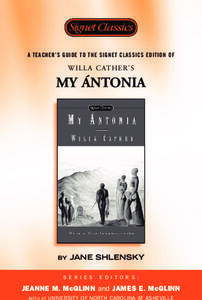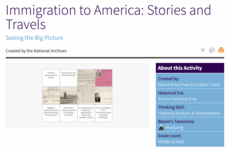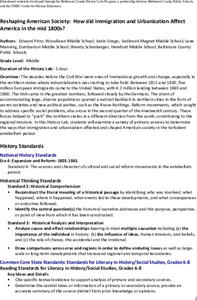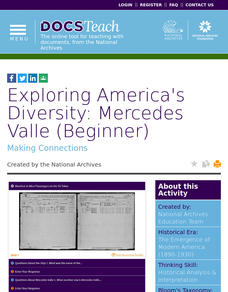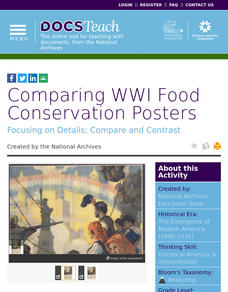Anti-Defamation League
"What is it Like to be an Outsider?”: Building Empathy for the Experiences of Immigrants
This instructional activity highlights the struggles of immigrants and the importance of showing empathy. Beginning with a read-aloud of a book in another language and a poem, scholars take part in a thoughtful discussion. Then, the...
Penguin Books
A Teacher's Guide to the Signet Classics Edition of Willa Cather's My Ántonia
Willa Cather's My Antonia might seem like a hard sell for today's teen readers. Rather than dramatic plot twists, trysts, and terrors, the novel celebrates the pioneer spirit that lead immigrants to a small Nebraska town. The Signet...
Facing History and Ourselves
Many Voices, One National Identity
To conclude the unit on "Exploring Identity in the United States," pupils consider whether it is possible to combine many voices into one national identity. After creating an identity chart that lists words, phrases, and images that they...
Facing History and Ourselves
Finding Your Voice
To begin a study of what it means to be American, high schoolers first consider their own identities. They draw a picture of what they think an American looks like and share their images. Next, they examine an image of the "Flag of...
National Endowment for the Humanities
“The Great Migration” by Minnie Bruce Pratt
Minnie Bruce Pratt's poem, "The Great Migration," offers young scholars an opportunity to reflect on how where we come from influences who we are. Groups conduct a close reading of the poem, recording observations about the poem's...
National Endowment for the Humanities
“Every Day We Get More Illegal” by Juan Felipe Herrera
A study of Jan Felipe Herrera's poem "Every Day We Get More Illegal" opens the door for a discussion on immigration. To begin, class members examine the photograph "Desert Survival," record their observations of the image, and then...
DocsTeach
Immigration to America: Stories and Travels
An eye-opening activity uses documents and photos to help academics understand the factors that pushed or pulled immigrants to America. Young historians group photos based on a push or pull factor, then complete a worksheet. Scholars...
DocsTeach
How Have Americans Responded to Immigration?
While America says it welcomes from other countries the tired and poor yearning to be free, the record is mixed on whether there has been a warm reception for immigrants. Class members use an interactive graphic scale and primary source...
Center for History Education
Reshaping American Society: How did Immigration and Urbanization Affect America in the mid 1800s?
From the Know-Nothings to the Bible Riots, immigration and urbanization changed the face of America in the middle of the 1800s. Using documents that range from immigrant experiences to renderings of violent conflict between immigrants...
News Literacy Project
News Goggles: Lionel Ramos, Oklahoma Watch
Given all the recent criticism of the news media and coverage, it's crucial that young people are given the tools they need to evaluate what they see, hear, and read about current events. A video interview from "News Goggles" introduces...
DocsTeach
WWI America: Babe Ruth's Draft Card
Even the Great Bambino wasn't above suspicion during World War I. An eye-opening activity explores America's greatest pastime through the lens of government officials during WWI. Academics examine Babe Ruth's draft card to understand how...
DocsTeach
The Impact of the Immigration Act of 1924
Welcome to America ... only if you're on an approved list. The activity uses a map to explain how the Immigration Act of 1924 placed quotas on immigration from certain countries, such as India. Scholars analyze the map, complete a...
DocsTeach
Ports of Immigration: Angel Island and Ellis Island
Young historians travel back to the past to explore immigration in the United States. Scholars match images of immigrants to Angel and Ellis Island. The activity also includes a worksheet and a short group discussion to understand...
Smithsonian Institution
Hidden Histories: Mexican Repatriation During the 1930s
Mexican Repatriation: the forgotten deportation of American citizens. The resource focuses on the deportation of Mexican American citizens during the Great Depression. Young historians read documents, complete a free-write, and fill out...
Smithsonian Institution
A Dream Deferred: DACA
"Give us your tired, your poor, your huddled masses" has even more meaning for some children. The resource explores the Deferred Action for Childhood Arrivals (DACA) program. Scholars analyze primary sources and participate in group...
Smithsonian Institution
A New America: The Hart-Celler Immigration Act of 1965
Many dream of coming to America, but few may enter. The instructional activity explores the Hart-Celler Immigration Act of 1965 and how it changed immigration policies in the United States. Academics learn how immigration quotas impacted...
Smithsonian Institution
Us vs. Them: The Chinese Exclusion Act of 1882
Immigration issues are nothing new. An interesting lesson focuses on the racially motivated Chinese Exclusion Act of 1882 and its impact on the Chinese American community. Scholars read articles, analyze political cartoons, and...
Smithsonian Institution
Racism and Removal: Japanese Incarceration During World War II
During World War II people saw how far the government's control would go, but it was at the expense of its citizens. The resource brings the conditions of Japanese American internment camps to light using primary documents. Scholars...
Smithsonian Institution
Borders and Community: Early 20th Century Chicago Neighborhoods and Ethnic Enclaves
Chicago is one city, four neighborhoods, and countless nationalities. The lesson explores the ethnic division of Chicago in the early twentieth century. Academics read primary sources, analyze maps, and tour an online exhibit to...
DocsTeach
Exploring America's Diversity: Rosalia Fundaro (Beginner)
Elementary scholars learn about the life of Rosalia Fundaro, an Italian immigrant, using primary sources. They analyze documents, complete written prompts, and participate in group discussion to understand Rosalia's life in the United...
DocsTeach
Exploring America's Diversity: Motel Garber (Beginner)
Young detectives delve into the past in an exciting series exploring immigration. The activity uses primary sources to teach elementary scholars historical analysis. Academics read records to understand the life of Motel Garber, from...
DocsTeach
Exploring America's Diversity: Mercedes Valle (Beginner)
An enlightening activity focuses on the life of Mercedes Valle, an immigrant from Ecuador. Scholars analyze ships and census records to understand the life of Mercedes Valle. In addition, they participate in a group discussion and...
DocsTeach
Exploring America's Diversity: Luther Powell (Beginner)
Luther Powell immigrated to the United States to live the American dream—and create a better life for his son, four-star general Colin Powell. Elementary academics look at documents, such as, ship records to understand the immigration...
DocsTeach
Comparing WWI Food Conservation Posters
Food will win the war! At least, that is what some World War I-era posters say. Using two propaganda posters—one in English and one in Yiddish—young scholars consider why the Wilson administration had the posters created. Discussion...



